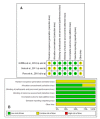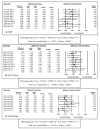Psilocybin as a New Approach to Treat Depression and Anxiety in the Context of Life-Threatening Diseases-A Systematic Review and Meta-Analysis of Clinical Trials
- PMID: 32899469
- PMCID: PMC7554922
- DOI: 10.3390/biomedicines8090331
Psilocybin as a New Approach to Treat Depression and Anxiety in the Context of Life-Threatening Diseases-A Systematic Review and Meta-Analysis of Clinical Trials
Abstract
Psilocybin is a naturally occurring tryptamine known for its psychedelic properties. Recent research indicates that psilocybin may constitute a valid approach to treat depression and anxiety associated to life-threatening diseases. The aim of this work was to perform a systematic review with meta-analysis of clinical trials to assess the therapeutic effects and safety of psilocybin on those medical conditions. The Beck Depression Inventory (BDI) was used to measure the effects in depression and the State-Trait Anxiety Inventory (STAI) was used to measure the effects in anxiety. For BDI, 11 effect sizes were considered (92 patients) and the intervention group was significantly favored (WMD = -4.589; 95% CI = -4.207 to -0.971; p-value = 0.002). For STAI-Trait, 11 effect sizes were considered (92 patients), being the intervention group significantly favored when compared to the control group (WMD = -5.906; 95% CI = -7.852 to -3.960; p-value ˂ 0.001). For STAI-State, 9 effect sizes were considered (41 patients) and the intervention group was significantly favored (WMD = -6.032; 95% CI = -8.900 to -3.164; p-value ˂ 0.001). The obtained results are promising and emphasize the importance of psilocybin translational research in the management of symptoms of depression and anxiety, since the compound may be effective in reducing symptoms of depression and anxiety in conditions that are either resistant to conventional pharmacotherapy or for which pharmacologic treatment is not yet approved. Moreover, it may be also relevant for first-line treatment, given its safety.
Keywords: anxiety; clinical trials; depression; meta-analysis; psilocybin; systematic review.
Conflict of interest statement
The authors declare no conflict of interest.
Figures



References
Publication types
Grants and funding
LinkOut - more resources
Full Text Sources

